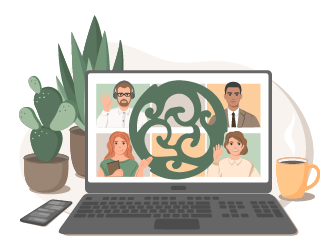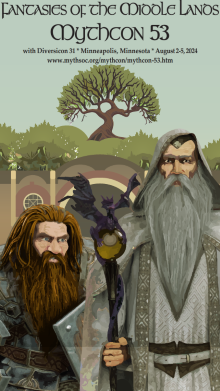Loading...
Document Type
Paper
Event Website
http://www.mythsoc.org/mythcon/mythcon-51.htm
Start Date
31-7-2021 3:30 PM
End Date
31-7-2021 4:15 PM
Description
J. R. R. Tolkien coined the term mythopoeia as a philosophical concept referring to the process of artificially creating mythologies and belief systems of imaginary worlds. While building a fantasy world, one ought to consider the possibilities this world offers for religious explorations or examine how the existing pantheons weave their way into fiction and reality. To be more precise, what happens when gods lounge languidly among their supposed believers. This paper aims to examine mythopoetic tendencies, elements and powers in Neil Gaiman’s novels American Gods and Anansi Boys, a fictional duology whose protagonists are in constant cohort with various gods—whether they like it or not. American Gods follows the former convict Shadow, who unwittingly joins forces with the Old Norse high god Odin, who has primed himself to declare, and preferably, win the war against the new American pantheon born out of worship, dependency and addiction to the internet, media, conspiracy theories and corporate environments. Gods are envisioned as entities, which are brought to life through cultural practices, customs and repetitive claims, which makes them exponentially more powerful as their followership grows, but also susceptible to being disempowered and dissipation if they are forgotten. This vulnerability makes them aggressive and willing to bring on the combined force of many apocalypses in order to assert dominance and ensure their continued survival. On the other hand, Anansi Boys, while still embroiled in godly affairs, concerns itself with creating the myth of the self through a reversed hero’s journey. Charlie, an average clerk, wishes only to lead a normal life away from his family. Yet, the news of his father’s death sets a series of inexplicable events into motion, including the return of Charlie’s not entirely real, but certainly evil twin, as well as a number of gods from the Caribbean pantheon. In order to save his reality, Charlie must accept his heritage, becoming a mythopoet of the self, who has the power to narrate his own existence outside of meddlesome gods’ wills. This paper will provide a theoretical overview of how myths are born and reproduced throughout social and cultural DNA before endeavouring to shed light on mythopoeia in American Gods and Anansi Boys, with a view to hinting at the narrative power of myths and their ascent into reality.
Tech Mod: Jessica Dickinson Goodman.
Included in
Mythopoeia in American Gods
J. R. R. Tolkien coined the term mythopoeia as a philosophical concept referring to the process of artificially creating mythologies and belief systems of imaginary worlds. While building a fantasy world, one ought to consider the possibilities this world offers for religious explorations or examine how the existing pantheons weave their way into fiction and reality. To be more precise, what happens when gods lounge languidly among their supposed believers. This paper aims to examine mythopoetic tendencies, elements and powers in Neil Gaiman’s novels American Gods and Anansi Boys, a fictional duology whose protagonists are in constant cohort with various gods—whether they like it or not. American Gods follows the former convict Shadow, who unwittingly joins forces with the Old Norse high god Odin, who has primed himself to declare, and preferably, win the war against the new American pantheon born out of worship, dependency and addiction to the internet, media, conspiracy theories and corporate environments. Gods are envisioned as entities, which are brought to life through cultural practices, customs and repetitive claims, which makes them exponentially more powerful as their followership grows, but also susceptible to being disempowered and dissipation if they are forgotten. This vulnerability makes them aggressive and willing to bring on the combined force of many apocalypses in order to assert dominance and ensure their continued survival. On the other hand, Anansi Boys, while still embroiled in godly affairs, concerns itself with creating the myth of the self through a reversed hero’s journey. Charlie, an average clerk, wishes only to lead a normal life away from his family. Yet, the news of his father’s death sets a series of inexplicable events into motion, including the return of Charlie’s not entirely real, but certainly evil twin, as well as a number of gods from the Caribbean pantheon. In order to save his reality, Charlie must accept his heritage, becoming a mythopoet of the self, who has the power to narrate his own existence outside of meddlesome gods’ wills. This paper will provide a theoretical overview of how myths are born and reproduced throughout social and cultural DNA before endeavouring to shed light on mythopoeia in American Gods and Anansi Boys, with a view to hinting at the narrative power of myths and their ascent into reality.
Tech Mod: Jessica Dickinson Goodman.
https://dc.swosu.edu/mythcon/mc51/schedule/17



Comments
Recorded Session